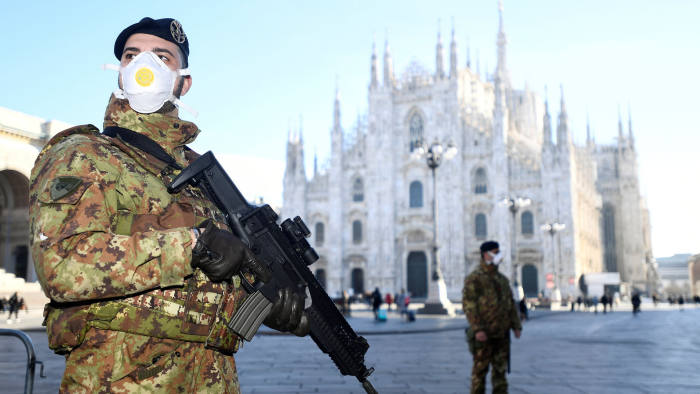By Alex Day
Italy now mourns more dead from the novel coronavirus than any other country in the world, with the nation’s death toll surpassing China’s on Thursday. Currently in nationwide lockdown, the usually bustling sites of Vatican Square and the Rialto Bridge are now ominously quiet. The Italian death toll now sits at over 3,400 fatalities and over 40,000 recorded cases, with hundreds being added to both figures with every passing day. How did the situation get so catastrophic – in Italy, of all places, the opposite side of the globe from Wuhan?

Experts tend to attribute the ruinous effect of the novel coronavirus on Italy to its demography. Indeed, Italy has the second oldest population in the world, which is obviously a factor in the rapid spread and devastating death toll the virus has wreaked upon the country. The elderly are more severely affected by the novel coronavirus due to their weaker immune and respiratory systems, the latter of which the virus viciously attacks. However, if Italy’s elderly population was solely to blame for the rampant spread of the virus in the country, surely Japan – which has the world’s oldest population – would have seen similar devastation. This is not the case – as of March 18th, Japan has only recorded 850 cases, despite its far closer proximity to the origin of the virus. This suggests that Italy has been badly affected because of one, or perhaps a combination of many, other variables.

The authorities’ response to the virus was slow, which undoubtedly quickened its spread. Experts suggest that the virus has been spreading in Italy since mid-January, despite the first cases officially being diagnosed a month later. For too long, a ‘business as usual’ attitude was adopted, which hastened the spread of the virus. Even now, 40,000 people are having charges pressed against them by Italian authorities for violating the nationwide lockdown.
There are various sources that leave the impression that a minority of the populace are not taking the lockdown seriously, or simply ignoring it altogether. G. Bancheri, Mayor of Delia, said in a live Facebook announcement: “Sunday there were people having parties, barbecues. Are they serious? That’s how you transmit the disease!” A more obvious example occurred in Sciacca, where a man diagnosed with coronavirus was found shopping by police despite his explicit instructions to self-isolate. Indeed, this behaviour is the exception, not the rule – but a minority behaving like this is all it takes to hasten the spread of the virus and reverse the intended progress of lockdown. Due to a combination of its elderly population, the state’s delayed response to the virus and the more relaxed lockdown measures compared to China’s, the novel coronavirus has had a ruinous effect on Italy. Although it sounds harsh, lockdown must be ruthlessly enforced if it is to serve its purpose.
Italy’s hospitals are sheer chaos right now – health services are nowhere near sufficiently equipped to deal with the overwhelming number of new patients after the country’s failure to flatten the curve. On Wednesday, Italy recorded 475 deaths from the virus – the highest number from any single country since the outbreak began. A video by Sky News shows an Italian hospital chock-full of patients on ventilators, packed into the corridors and waiting areas of the hospital due to the ICU being filled to capacity long ago. I encourage you to watch this bleak foreshadowing of Britain’s fate if sufficient measures are not quickly implemented:
Compared with China, Italy’s lockdown has been somewhat lacklustre. Times of crisis such as this may indeed be one of the few occasions where authoritarianism and total governmental control come in handy; lockdown in Wuhan is ruthlessly enforced and has finally began to yield some real results. Case numbers are no longer rising – on Thursday, Wuhan recorded no new coronavirus cases for the first time since the outbreak began. This suggests that more harshly enforced lockdown procedures, despite their interruptive and inconvenient nature, may serve to bring this nightmare to an end more effectively.


Leave a Reply